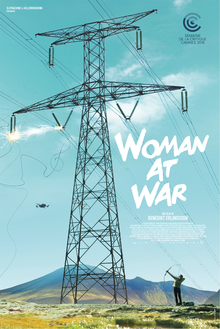
So I had no idea that Icelandic-Ukrainian co-produced films are even a thing but I suppose they must be and this one even has a zany, absurdist twist to it. To be honest, the politics and ideology that this film espouses is completely contrary to my own beliefs. Yet it can’t be denied that this is wonderfully executed on every level and succeeds in forging a kind of mythos of an environmental warrior.
A multinational company has invested in an aluminium smelting plant in Iceland but their operations are continually being disrupted by sabotage. An environmental activist, Halla, keeps attacking the transmission pylons that bring power to the plant, using sophisticated techniques to cover her tracks and avoid being caught. Her day job is a choir conductor and she is assisted in her efforts by a sympathetic mole inside the Icelandic government. However she has to reconsider her plans when she is informed that her application to adopt a child, made many years ago, has been successful. The child in question is a Ukrainian orphan and Halla gets her twin sister who is unaware of her illegal activities to act as a backup custodian. Even as the government brings in the CIA to help investigate, she ramps up her efforts by distributing her manifesto and sets out to cause more permanent damage.
Putting aside the wisdom of what Halla is trying to accomplish, this makes for a remarkably effective and riveting thriller. This middle-aged woman is decidedly not an action movie star but that only makes her a more sympathetic and believable character and the stakes more real. As an outdoorsy person, it makes sense that she is fit and has decent survival skills. At the same time, she’s also someone who has read all the same Internet articles as us and is intelligent enough to take precautions like putting her cell phone in the fridge when she needs to have a conversation she doesn’t want the government to listen in on and using masks and aluminium foils to defeat cameras and infrared sensors. She does have some help and allies so it’s not too unbelievable that she is able to steal explosives from a depot. It all adds up a reasonably realistic depiction of a lonely David struggling against a powerful government apparatus and hence is a better thriller than any James Bond film I can think of.
Yet the ideology inherent in a piece like this truly is dodgy. I absolutely get the rage and frustration of feeling powerless as the whole world seemingly does nothing in the face of climate change. But Halla’s actions here are the furthest that you can get to solve the problem. Having an aluminium smelter in Iceland is as ideal as you can get due to its clean energy sources, high environmental standards with strong oversight and presumably well-compensated labor. Short of reverting to a low technology agrarian society, this is as good as we can do and it’s not like the film says anything about the farmer cousin who rears animals that are also an important source of greenhouse gases. This film thus makes for a great example of how films, and maybe art in general, has problems with the scale and nature of threats like global warming. The real solutions are boring affairs like carbon taxes and regulations to reshape society in small ways, but systematically and comprehensively. But this is almost impossible to capture in a work of art. On the other hand, an image of Halla seemingly using a bow to shoot an arrow at an electricity pylon in conscious imitation of Don Quixote is powerfully dramatic and instantly comprehensible. Yet by offering these easy solutions, it is doing the world a disservice.
Woman at War remains a well made and entertaining thriller and it’s well worth watching for that. I can also sympathize with the director’s sentiments and his sense of rage. But anyone who tries to do what Halla does in this film would deservedly be treated as a terrorist by society and she should never be seen as a heroine. This is unilaterally taking the easy road, instead of the much more difficult path of convincing most of society to collectively make the appropriate sacrifices.